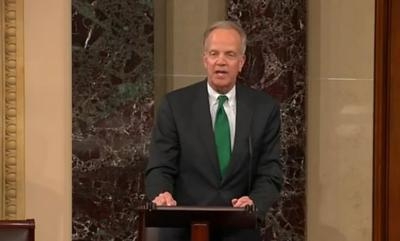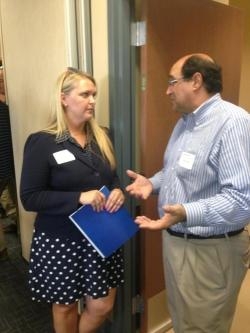AUVSI Event Attended By U.S. Senator Jerry Moran
Unmanned aircraft systems will have a significant impact on Kansas' precision agriculture industry and overall economy, according to elected officials, academics and industry leaders speaking at a UAS flight demonstration at Crisis City in Salina, July 2.

U.S. Senator Jerry Moran (R-KS) (pictured) joined leaders at Kansas State University and Michael Toscano, president and CEO of the Association for Unmanned Vehicle Systems International (AUVSI), to launch a flight demonstration of numerous UAS used to enhance the care of crops, livestock, pasture and rangelands. Sen. Moran and Toscano also delivered remarks on the significant economic growth and job creation potential of UAS in Kansas.
"As a global leader in aviation and aerospace, Kansas is a pioneer in the Unmanned Aircraft Systems market, which holds great promise for boosting the economy and creating jobs in our state," Sen. Moran said. "As the aerospace industry grows and looks to take on new UAS ventures and industries, there is real potential for this platform to be used responsibly and safely in an industry already booming in Kansas: agriculture. The number of ways farmers and ranchers can utilize UAS are endless - from mapping the spread of disease or insects within a field to applying fertilizer to a specific area of crops - and I look forward to continued progress in this field."
As a national leader in UAS advancement, Kansas is poised to benefit significantly from the rapidly growing unmanned systems industry and the forthcoming integration of UAS into the U.S. airspace. A recent AUVSI study projects that UAS integration will contribute an economic impact of $2.9 billion and create 3,716 new jobs in Kansas by 2025.
"Today's flight demonstrations highlight one of the greatest potential applications for unmanned aircraft technology - saving farmers millions of dollars in time and resources," said Michael Toscano. "Integrating UAS into the national airspace will lead to a host of new uses, and Kansas is well-positioned to reap the economic benefits that will accompany the expanded use of this technology."

The agriculture sector is expected to be the largest market for UAS technology, the AUVSI study finds, accounting for 80 percent of all commercial use. Among many other agricultural benefits, UAS could provide a cost-effective way to protect crop health and observe overall farm performance. In 2015 alone, the total economic impact of agriculture spending on unmanned aircraft in Kansas is estimated to reach more than $75 million, with 772 new jobs created. "We at Kansas State are excited to see the progression of this technology to the point where it can really start benefiting the general population and agriculture is the perfect place to start since it touches so many people," said Dr. Kurt Barnhart, a professor, head of the department of aviation, and executive director of the Applied Aviation Research Center at Kansas State University.
The incorporation of UAS is a growing trend in precision agriculture, as it makes farming more efficient and cost effective. UAS could provide farmers with a low-cost way to spray for pests and diseases, analyze soil patterns, and check crops for signs of drought and blight. UAS can save farmers the significant cost of hiring or operating manned aircraft. "I see significant economic development opportunities for Salina and the State of Kansas," said Tim Rogers, A.A.E., executive director of the Salina Airport Authority. "The UAS industry offers opportunities for young Kansans to secure premium jobs right here at home."
Scientists in the U.S. have already begun using small remote-controlled helicopters to help farmers detect diseases and stress in their crops. The helicopters take photographs and measurements that allow farmers to keep an eye on their large fields. An increasing number of American colleges and universities, such as Kansas State, are advancing UAS technology as a tool in agriculture as well.
For example, researchers at Kansas State have been able to use UAS to far more accurately and efficiently locate and quantify harmful algae affecting many Kansas lakes and ponds. The University has also successfully demonstrated that UAS can be used to greatly reduce the time required to identify how environmental and genetic interactions affect the characteristics of plants. In addition, researchers are currently working on projects that will deliver detailed economic benefits on how UAS can impact growers, seed distributors, and crop breeders.
(Lower image: (L-R) Salina Area Chamber of Commerce Economic Development Director Beth Shelton, Association for Unmanned Aerial Vehicle Systems International President and CEO Michael Toscano.)
 ANN's Daily Aero-Term (12.01.25): Convective SIGMET
ANN's Daily Aero-Term (12.01.25): Convective SIGMET ANN's Daily Aero-Linx (12.01.25)
ANN's Daily Aero-Linx (12.01.25) NTSB Final Report: Remos Aircraft GmbH Remos GX
NTSB Final Report: Remos Aircraft GmbH Remos GX Aero-News: Quote of the Day (12.02.25)
Aero-News: Quote of the Day (12.02.25) ANN's Daily Aero-Term (12.02.25): Coupled Approach
ANN's Daily Aero-Term (12.02.25): Coupled Approach




